- Home
- Gore Vidal
Burr
Burr Read online
ACCLAIM FOR
GORE VIDAL’s
BURR
“An extraordinarily intelligent and entertaining novel.” —Newsweek
“A dazzling entertainment, a tour de force of historical imagination, a devastating analysis of America’s first principles.”
—The New York Times Book Review
“Like a bruised apple, Burr has long lain ready for peeling, and what a fascinating book Vidal has made of him!” —Atlantic Monthly
“Burr is a bravura tour de force, a brilliant evocation of the American political scene.” —Publishers Weekly
GORE VIDAL
BURR
Gore Vidal was born in 1925 at the United States Military Academy at West Point. His first novel, Williwaw, written when he was nineteen years old and serving in the Army, appeared in the spring of 1946. Since then he has written twenty-two novels, five plays, many screenplays, short stories, well over two hundred essays, and a memoir.
NARRATIVES OF EMPIRE
BY
GORE VIDAL
Burr
Lincoln
1876
Empire
Hollywood
Washington, D.C.
The Golden Age
FIRST VINTAGE INTERNATIONAL EDITION, FEBRUARY 2000
Copyright © 1973 by Gore Vidal
All rights reserved under International and Pan-American Copyright Conventions. Published in the United States by Vintage Books, a division of Random House, Inc., New York, and simultaneously in Canada by Random House of Canada Limited, Toronto. Originally published in hardcover in the United States by Random House, Inc., New York, in 1973.
Vintage is a registered trademark and Vintage International and colophon are trademarks of Random House, Inc.
The Library of Congress has cataloged the Random House edition as follows:
Vidal, Gore, 1925–
Burr: a novel.
1. Burr, Aaron, 1756–1836—Fiction. I. Title.
PZ3.V6668BU 813’.5’4 73-3985
eISBN: 978-0-307-79841-1
www.vintagebooks.com
v3.1
FOR MY NEPHEWS
Ivan, Hugh, and Burr
Contents
Cover
About the Author
Other Books by This Author
Title Page
Copyright
Dedication
1833
Chapter One
Chapter Two
Chapter Three
Chapter Four
Chapter Five
Chapter Six
Chapter Seven
Chapter Eight
Chapter Nine
Chapter Ten
Chapter Eleven
Chapter Twelve
1834
Chapter One
Chapter Two
Chapter Three
Chapter Four
Chapter Five
Chapter Six
Chapter Seven
Chapter Eight
Chapter Nine
Chapter Ten
Chapter Eleven
Chapter Twelve
Chapter Thirteen
Chapter Fourteen
Chapter Fifteen
Chapter Sixteen
Chapter Seventeen
Chapter Eighteen
Chapter Nineteen
Chapter Twenty
Chapter Twenty-one
Chapter Twenty-two
Chapter Twenty-three
Chapter Twenty-four
Chapter Twenty-five
Chapter Twenty-six
Chapter Twenty-seven
Chapter Twenty-eight
Chapter Twenty-nine
Chapter Thirty
Chapter Thirty-one
Chapter Thirty-two
Chapter Thirty-three
Chapter Thirty-four
Chapter Thirty-five
Chapter Thirty-six
1835
Chapter One
Chapter Two
Chapter Three
Chapter Four
Chapter Five
Chapter Six
Chapter Seven
Chapter Eight
Chapter Nine
Chapter Ten
Chapter Eleven
Chapter Twelve
Chapter Thirteen
Chapter Fourteen
Chapter Fifteen
1836
Chapter One
Chapter Two
Chapter Three
Chapter Four
Chapter Five
Chapter Six
Chapter Seven
Chapter Eight
Chapter Nine
Chapter Ten
Chapter Eleven
1840
Afterword
1833
One
A Special Despatch to the New York Evening Post:
SHORTLY BEFORE MIDNIGHT, July 1, 1833, Colonel Aaron Burr, aged seventy-seven, married Eliza Jumel, born Bowen fifty-eight years ago (more likely sixty-five but remember: she is prone to litigation!). The ceremony took place at Madame Jumel’s mansion on the Washington Heights and was performed by Doctor Bogart (will supply first name later). In attendance were Madame Jumel’s niece (some say daughter) and her husband Nelson Chase, a lawyer from Colonel Burr’s Reade Street firm. This was the Colonel’s second marriage; a half-century ago he married Theodosia Prevost.
In 1804 Colonel Burr—then vice-president of the United States—shot and killed General Alexander Hamilton in a duel. Three years after this lamentable affair, Colonel Burr was arrested by order of President Thomas Jefferson and charged with treason for having wanted to break up the United States. A court presided over by Chief Justice John Marshall found Colonel Burr innocent of treason but guilty of the misdemeanour of proposing an invasion of Spanish territory in order to make himself emperor of Mexico.
The new Mrs. Aaron Burr is the widow of the wine merchant Stephen Jumel; reputedly, she is the richest woman in New York City, having begun her days humbly but no doubt cheerfully in a brothel at Providence, Rhode Island.…
I DON’T SEEM ABLE to catch the right tone but since William Leggett has invited me to write about Colonel Burr for the Evening Post, I shall put in everything, and look forward to his response. “I don’t think,” he’ll gulp air in his consumptive way, “that the managing editor will allow any reference to what he calls ‘a disorderly house.’ ”
Well, the euphemisms can come later. Lately, mysteriously, Leggett has shown a sudden interest in Colonel Burr, although his editor, Mr. Bryant, finds my employer “unsavoury. Like so many men of the last century, he did not respect the virtue of women.”
Because I am younger than Mr. Bryant, I find Colonel Burr’s “unsavouriness” a nice contrast to the canting tone of our own day. The eighteenth-century man was not like us—and Colonel Burr is an eighteenth-century man still alive and vigorous, with a new wife up here in Haarlem, and an old mistress in Jersey City. He is a man of perfect charm and fascination. A monster, in short. To be destroyed? I think that is what Leggett has in mind. But do I?
I sit now under the eaves of the Jumel mansion. Everyone is asleep—except the bridal couple? Sombre thought, all that aged flesh commingled. I put it out of my mind.
The astonishing day began when Colonel Burr came out of his office and asked me to accompany him to the City Hotel where he was to meet a friend. As usual, he was mysterious. He makes even a trip to the barber seem like a plot to overthrow the state. Walking down Broadway, he positively skipped at my side, no trace of the stroke that half paralyzed him three years ago.
At the corner of Liberty Street the Colonel paused to buy a taffy-apple. The apple-woman knew him. But then every old New Yorker knows him by sight. The ordinary people greet him warmly while the respectable folk te
nd to cut him dead, not that he gives them much opportunity for he usually walks with eyes downcast, or focussed on his companion. Yet sees everything.
“For himself the Colonel, and not a dear worm in it!” Obviously a joke between Burr and the old biddy. He addressed her graciously. Business men hurrying across from Wall Street quickly take him in with their eyes; and look away. He affects not to notice the sensation his physical presence still occasions.
“Charlie, are you free for an adventure tonight?” This was mumbled. He lacks a full complement of teeth and the taffy was not helpful.
“Yes, Sir. What sort of adventure?”
The large black eyes gave me a mischievous look. “Half the fun of an adventure is the surprise.”
In front of the City Hotel an omnibus was stopped: its horses neighing, pissing, groaning. Stout prosperous men converged on the hotel: sundown is their time of day to meet, gossip, drink—then go home on foot because it is faster than by carriage. Now-a-days lower Broadway is blocked with traffic at this hour and everyone walks; even the decrepit John Jacob Astor can be seen crawling along the street like some ancient snail, his viscous track the allure of money.
Instead of going inside the hotel, the Colonel (put off by a group of Tammany sachems standing in the doorway?) turned into the graveyard of Trinity Church. I followed, obediently. I am always obedient. What else can a none-too-efficient law clerk be? I cannot think why he keeps me on.
“I know—intimately—more people in this charming cemetery than I do in all of the Broad Way.” Burr makes a joke of everything; his manner quite unlike that of other people. Was he always like this or did the years of exile in Europe make him different from the rest of us? or—new thought—have the manners of the New Yorkers changed? I suspect that is the case. But if we seem strange to him, he is much too polite to say so, as he lives on and on amongst us: full of the devil, my quarry.
In the half-light of the cemetery, Burr did resemble the devil—assuming that the devil is no more than five foot six (an inch shorter than I), slender, with tiny feet (hooves?), high forehead (in the fading light I imagine vestigial horns), bald in front with hair piled high on his head, powdered absently in the old style, and held in place with a shell comb. Behind him is a monument to the man he murdered.
“I shall want to be buried at Princeton College. Not that there’s any immediate hurry.” He glanced at Hamilton’s tomb. No change in expression in face or voice as he asked, “Do you know the works of Sir Thomas Browne?”
“No, Sir. A friend of yours?”
Burr only grinned, a bit of apple peel red as old blood on his remaining incisor. “No, Charlie. Nor was I present when Achilles hid himself among women.” Whatever that meant. I record it all. At Leggett’s suggestion I have decided to keep a full record of the Colonel’s conversation.
“I have always preferred women to men. I think that sets me apart, don’t you?”
Knowing exactly what he meant, I agreed. New York gentlemen spend far more time with one another in bars and taverns than in mixed company. Lately they have taken to forming clubs from which women are banned.
“I cannot—simply—be without the company of a woman.”
“But you’ve had no wife …”
“Since before you were born. But then I have not lacked for … gentle companionship.” He gives me a swift grin; suddenly in the pale light he looked to be a randy boy of fourteen. Then he abruptly became his usual self; full of dignity save for that curious unexpected wit. I always find his brilliance disturbing. We do not want the old to be sharper than we. It is bad enough that they were there first, and got the best things.
“We shall be met presently at the hotel by my old friend Dr. Bogart. He has rented a carriage. We shall then drive to the Haarlem Heights—or Washington Heights, as I believe they are currently known.” A fugitive smile. “What better name for an American height than ‘Washington’?”
I have taken some notes already on Burr’s view of General Washington. Unfortunately, his comments are cryptic, and seldom more than a single sentence like “How fitting that the first American president should have been a land surveyor.” He knows so much; tells so little. Well, I have made up my mind to know what he knows before the end.
Burr delights in tomb inscriptions. “Elizabeth! Of all people! Never knew she was dead.” Burr slipped on his octagonal glasses. “Died eighteen ten. That explains it. I was still in Europe. A fugitive from injustice.” Burr removed the glasses. “I think her birth date has been—as Jeremy Bentham would say—minimized. She was older than I and … beautiful! Beautiful, Charlie.” Burr pushed the glasses onto his forehead. In the churchyard trees birds chattered while Broadway’s traffic was at its rattling, creaking, neighing worst.
“I know you’re writing about my adventurous life.” I was startled. Showed it. My face reveals everything; always has. I have no guile. Must learn it. “I’ve observed you taking notes. Don’t fret. I don’t mind. If I were not so lazy I would do the job myself, having done part of it already.”
“An actual memoir?”
“Bits and pieces. I still have a lingering desire to tell the true story of the Revolution before it is too late, which is probably now since the legend of those days seems to be cast in lead if the schoolbooks are any guide. It is quite uncanny how wrong they are about all of us. Why do you see so much of Mr. Leggett at the Evening Post?”
I literally stumbled at the rapidity of his charge; and it was a charge, of the sort he is celebrated for in court during cross-examination.
The old man helped steady me.
I gabbled. “I see him because—I have known him since I was at Columbia. He used to come there, you know, to talk about literature. About journalism. I’d thought, perhaps, as a career, I might write for the press, before I took up the law …”
Whatever Burr wanted to get from me he must have got for he changed the subject as he led me out of the graveyard and into Broadway where the white-flaring hissing streetlamps were now being lit, and passers-by cast flickering dark shadows. I shuddered suddenly; thought of ghosts. After all, was I not with one who has so far refused to go to ground?
“When you next see Mr. Leggett, tell him how much I admire his editorials on the subject of nullification. I, too, am a Jacksonian, and oppose nullification.” A clue. Recently South Carolina claimed that it had the “right” not only to nullify federal laws but also to dissolve, if challenged, its connection with the union. If Colonel Burr had indeed wanted to separate the western states from the east (as everyone believes), he would favour South Carolina’s Nullification Act. Yet he does not. Or says he does not. He is a labyrinth. Must not lose my way.
Burr led me into the crowded bar-room of the City Hotel where we drank a good deal of Madeira (rare for him: tobacco is his one indulgence) until the arrival of Dr. Bogart, a thin white old man with a parrot’s face and a most birdly manner.
Burr was exuberant, festive. I still had no idea why. “Dominie, you’re late! No excuses. We must set out immediately! The tide is at the full.”
He put down his glass. I did the same, noticing how the gentlemen at the nearest table were straining to hear our every word. Not an easy thing to do considering the rumble of masculine voices in the smoky room, and the sound of the bar-tender cracking ice with a hammer.
“Heigh-ho!” Burr started briskly to the door, causing a covey of lawyers—some with awed bows of recognition—to scatter. “To the Heights, gentlemen.” He clapped his hands. “To the Heights! Where else?”
Two
I AM NOT USED to night travel. To be cooped up in a carriage in the dark is to be totally subtracted from the usual world. Non-existent yet perversely made aware of not existing by the clatter of hooves, jingle of harness, coachman’s curses and—on this night—by a hideous white half-moon that had drained the world of colour, caused trees and fields to hemorrhage their green, turn to black, white, silver all nature. For a time, I thought I was dead.
Certai
nly the two old men opposite me did not dispel the mood. Burr: “Wasn’t that the Wentworth place, the farm-house there, with the three chimneys?” Dr. Bogart: “No, Colonel. It was the Dutchman’s place. You know his name. With the bald wife who drowned at Fishkill in seventy-two or seventy-three.”
Will I be like them at their age? Talking of grisly death-beds and redundant gallantries? But then I am to have a short life, according to the Italian fortune-teller at Castle Garden. No garrulous old age for me. Good.
Meanwhile, in the carriage, I practised being nothing; and achieved for quite a long time the perfection of the nought, the zero. Yet I cheated: thought of future time—contemplated the hatching of that zero which contains me now and when it does break open, oh, the world will know that Charlie Schuyler has been added greatly to its sum! Why am I writing in mathematical terms? I have yet to learn the entire multiplication table and grow uneasy faced with a long division.
Describe! as Leggett keeps telling me. Describe! Very well.
Through open gates. Stone? Wood? Could not tell. Down a curving carriage way. Tall black trees. A view of the river in the distance. Light on water like tarnished silver (cannot do better—will try again later). Then the dark bulk of the mansion. Lights blazing at every window. A party? No. Burr would have wanted us to dress appropriately. But if not a party, why the lights? Even Madame Jumel, rich as she is, does not light every room to celebrate the approach of midnight.
The carriage stops at the front door. A black groom appears from the side of the house. We get down. Steps go up to a columned porch (there is a second-floor balcony). The house is vast, extending to left and right, suggesting all sorts of unexpected wings, dormers, cellars. It was built before the Revolution by a Tory named Morris. Later it was confiscated by the state. My parents used to come up here on Sundays when the mansion was a popular inn. Then Stephen Jumel bought it for his new wife and old mistress, Eliza Bowen (or something else) of Providence, Rhode Island.
Front door opens. Oblong of golden festive light. Large butler welcomes us. Colonel Burr hurries inside. I help the shuffling Dr. Bogart; weak in the legs, he staggers like a drunkard. Now for history—and a change in tense.

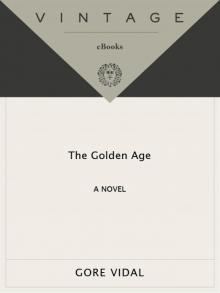 The Golden Age: A Novel
The Golden Age: A Novel Death Before Bedtime
Death Before Bedtime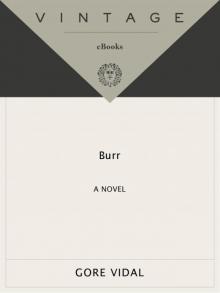 Burr
Burr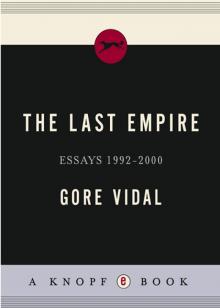 The Last Empire
The Last Empire Empire: A Novel
Empire: A Novel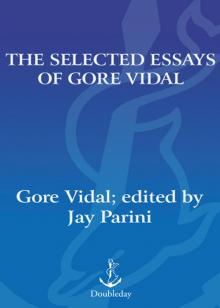 The Selected Essays of Gore Vidal
The Selected Essays of Gore Vidal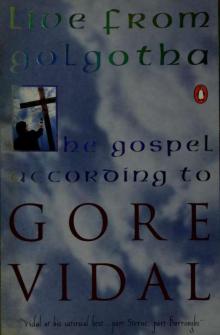 Live From Golgotha
Live From Golgotha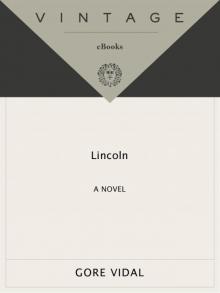 Lincoln
Lincoln Death Likes It Hot
Death Likes It Hot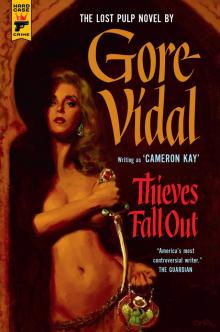 Thieves Fall Out (Hard Case Crime)
Thieves Fall Out (Hard Case Crime) Point to Point Navigation
Point to Point Navigation Williwaw
Williwaw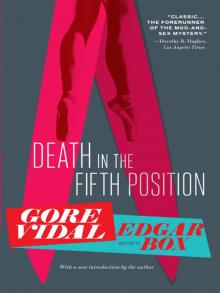 Death in the Fifth Position
Death in the Fifth Position In a Yellow Wood
In a Yellow Wood Julian
Julian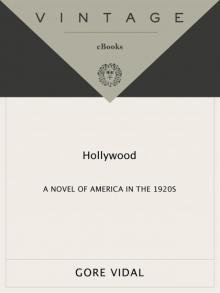 Hollywood
Hollywood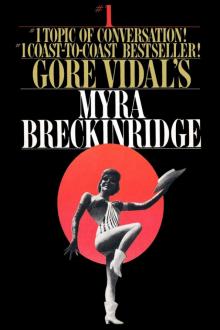 Myra Breckinridge
Myra Breckinridge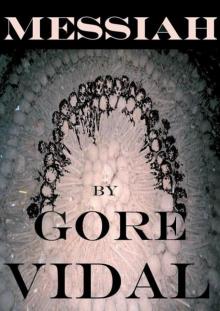 Messiah
Messiah The Second American Revolution and Other Essays 1976--1982
The Second American Revolution and Other Essays 1976--1982 Homage to Daniel Shays
Homage to Daniel Shays Empire
Empire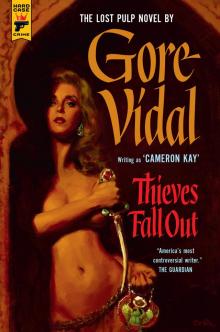 Thieves Fall Out
Thieves Fall Out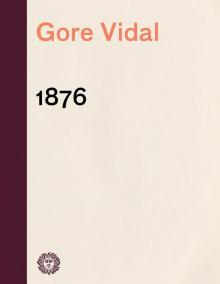 1876
1876 The City and the Pillar
The City and the Pillar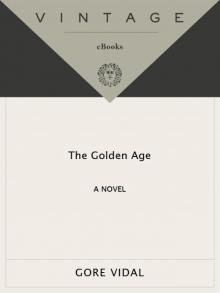 The Golden Age
The Golden Age At Home
At Home